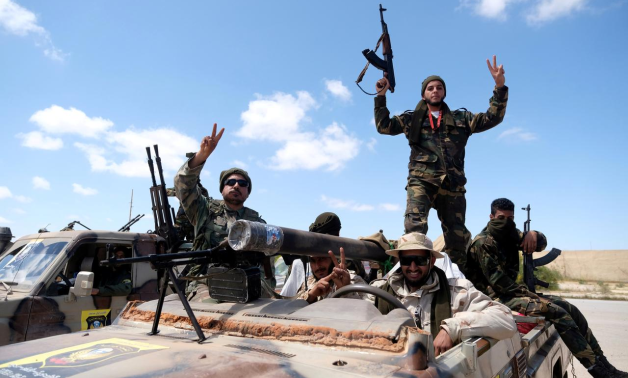
FILE PHOTO: Libyan National Army (LNA) members head out of Benghazi to reinforce troops advancing towards Tripoli, in Benghazi, Libya, April 7, 2019. REUTERS/Esam Omran Al-Fetori/File Photo
CAIRO - 28 September 2020: Libya is currently witnessing rapid developments to push the political process forward and stabilize the ceasefire in the country.
Several moves aimed at defusing the crisis and reaching a solution that satisfies all parties by restructuring the Presidency Council and selecting a new government during the upcoming Geneva meeting in mid-October.
A convergence of views has emerged between the eastern region of the country and the city of Misurata during the past few weeks, especially after Commander of the Tobruk-based Libyan National Army (LNA),KhalifaHaftar, agreed with the vice president of the Presidency Council, who grew up in Misurata, to resume production and export of oil.
They also agreed on forming a joint technical committee to monitor the fair distribution of wealth amongthe Libyan people.
It is noted that the Libyan media,which support the National Army,stopped the media campaigns that it wages almost daily against the representatives of Misurata.This is the same approach followed by the audio and visual media, funded by businessmen from Misurata, which indicates an unannounced agreement to stop the media campaign fight between the eastern Libyan camp and the city of Misurata.
On the other hand, the United Nations Support Mission in Libya(UNSMIL) is moving to pressure all Libyan parties to sign a complete ceasefire agreement in the country, before holding political dialogue meetings in Geneva, Switzerland, which is the biggest challenge facing the United Nations.
Morocco meetings faltered
In Morocco, meetings to unify sovereign institutions have faltered after Rabat failed to persuade the Libyan parties to finally sign an agreement on the resolutions of Bouznika meetings between the delegations of Parliament and the State Council.
The Moroccan Foreign Ministry intensified its contacts during the past hours to invite Speaker of the Libyan Parliament, AguilaSaleh, and the president of the Supreme Council of State to come to the country to sign the agreement.
The Libyan parties confirmed that their meetings in Bouznika aimed at setting up a specific mechanism for selecting the Libyan personalities nominated for the presidency of sovereign positions, a step supported by the United Nations mission.But, the latter seems to have backed away from the supporters. The mission urged Rabat to amend the approach and make it a mere amendment to the Skhirat Agreement, specifically Article 15 of the Political Agreement.
A conference for national reconciliation in Egypt
Within the framework of the ongoing moves to bring the views of the Libyans closer, Cairo will hostin the first half of October 2020 the largest Libyan national reconciliation with the participation of dozens of personalities, tribal sheikhs, and several representatives, to discuss a comprehensive reconciliation between all sects of the Libyan people, according to Hassan al-Mabrouk, a member of the preparatory committee for the national reconciliation conference set to be held in Egypt.
Mabrouk said that the committee calls on the Libyan authorities, the international community, and all concerned organizations to concert efforts to solve the Libyan crisis, preserve the country's unity and sovereignty, condemn foreign intervention, remove mercenaries, dissolve militias, and establish a comprehensive national reconciliation.
Mabroukalso confirmed in exclusive statements to Egypt Today that national reconciliation can only take place with the immediate release of prisoners and detainees, implementation and circulation of the general amnesty law issued by the Libyan Parliament, and compensation for the displaced. He also called on Dr. Saif Al-Islam Muammar Gaddafi and the leaders of the reference in Libya to lead the comprehensive national reconciliation.
Furthermore, Mabroukurged the Libyan authorities and the Security Council to address the International Criminal Court to lift the restrictions on Gaddafi and his companions,enabling them to contribute to achieving comprehensive national reconciliation and to support the stability and security of Libya.
Mabrouk appealed to the socialand religious leaders to fulfill their religious, social, and reform duty towards the country for the success of the comprehensive national reconciliation.
"Ten years of war, blood, destruction, waste of wealth, and the spread of hatred and rancor among Libyans are sufficient to compel us return to the political path that will unite Libyans and build state institutions," he said.
Earlier, Egypt’s President Abdel Fattah el-Sisi met with LAAF head, Commander KhalifaHaftar; and Libyan Parliamentary Speaker, AguilaSaleh, in Cairo, to discuss efforts to resolve the Libyan crisis. Both Libyan officials emphasized that any initiative to solve the crisis in the war-torn country has to include “the removal of Turkish-backed mercenaries and militias”.
It is worth mentioning that GNA Head Fayez al-Sarraj announced, earlier in September, his intention to resign by the end of October.
In late August, both Saleh and Sarraj announced in two separate statements that they had agreed on a Libya-wide ceasefire.
Libya has been marred in violence between competing forces, militias and extremists since the toppling and killing of Muammar Gaddafi in 2011. The conflict now pits the Tripoli-based Government of National Accord (GNA) against the Libyan National Army (LNA), led by Field Marshal KhalifaHaftar, for control of the country.
Comments
Leave a Comment